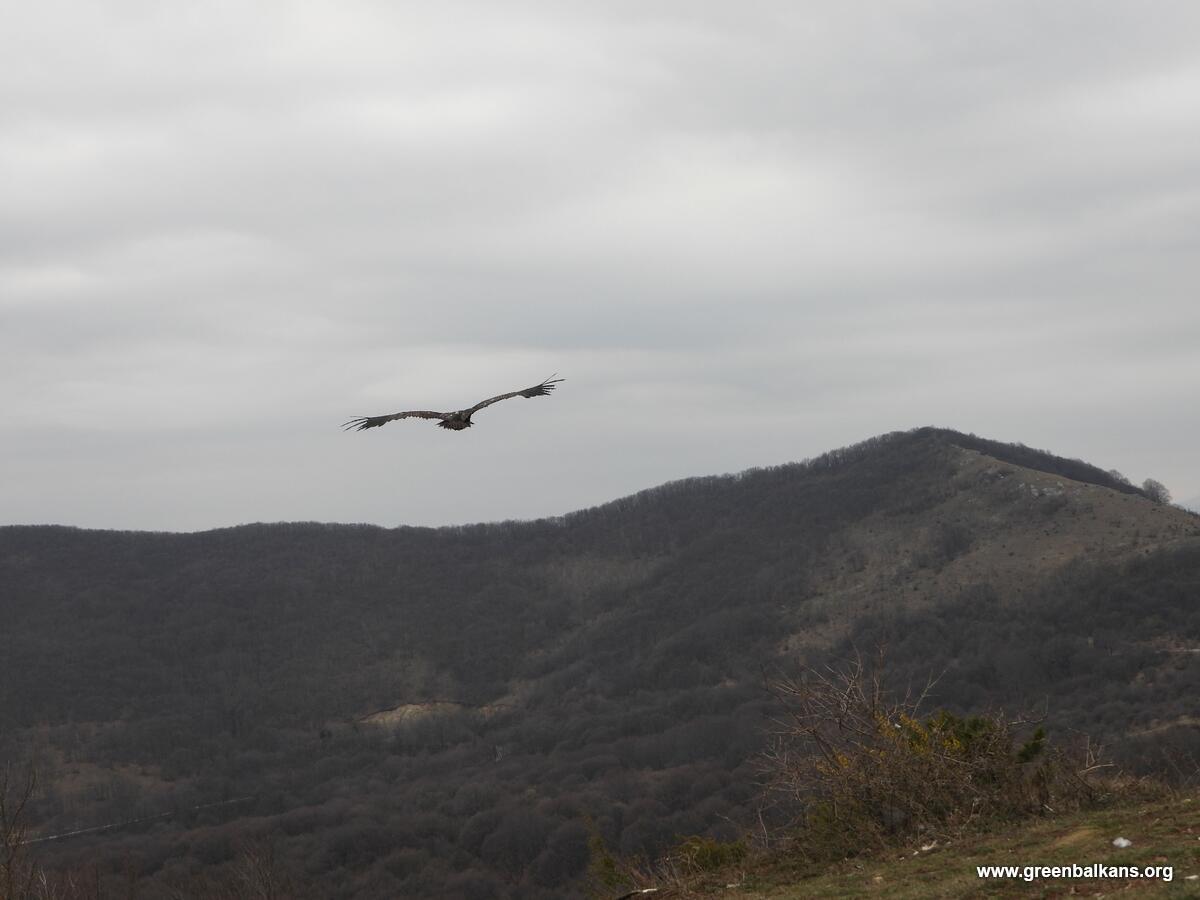The establishment of a small breeding unit at Green Balkans was decided upon nearly 20 years ago to ensure the future of the endangered Bearded Vulture (Gypeatus Barbatus) in Bulgaria.
At the time, it was not known when the releases could start, but it was clear that the Green Balkans staff would need to be prepared with the expertise required for managing and breeding Bearded Vultures in the future as part of the Bearded Vulture EEP programme.
After many years of tireless efforts, the breeding unit has now two thriving pairs and in December 2024 it received its long-awaited third Bearded Vulture pair.

Challenges of the early years
On 14 July 2007 the first breeding pair, BG496 and BG483, arrived in the Green Balkans Breeding Unit. Unfortunately, the male died just a month later due to aspergillosis, a respiratory infection that claimed his life after being further complicated by injuries inflicted by the female. This situation demonstrated a critical challenge: the female was dominant and aggressive, leading to the male’s eventual health decline.
Despite this setback, the team continued their efforts persistently. In the breeding season of 2007-2008, the female received a new mate. Over the years, this pair and their descendants gradually stabilized, reproducing successfully since 2016 and successfully forming the foundation of the first captive breeding programme in Bulgaria.
Preparing for unforeseen challenges paid off
To create a self-sustaining breeding programme and ensure a steady supply of young vultures for future releases, the decision was made to expand the captive breeding unit to include three breeding pairs. This strategy was essential for ensuring that, even in the face of potential disruptions such as avian influenza outbreaks, Green Balkans would be able to continue releasing birds without needing to rely on transfers from other European EEP (European Endangered Species Programme) centres.
This foresight has proven crucial. As one of Europe’s easternmost sites for Bearded Vulture conservation, Green Balkans Breeding Unit plays a strategic role. Ensuring that the centre has the necessary breeding capacity means that recovered vultures released in Bulgaria can remain in their natural range without the negative implications of international transfers for veterinary treatments. The presence of experienced staff proficient in Bearded Vulture management and veterinary care has become indispensable to the success of this project.
Steady progress
The year 2019 marked another important milestone with the arrival of a new young pair, BG1034 and BG999. The male, BG1034, was born in 2019 and is genetically 25% Crete and 75% Asian. The female, BG999, is from the 2018 cohort and is entirely of Asian lineage. This pair holds promise, as they have reached sexual maturity and are expected to start breeding in the near future. Their successful integration into the programme continues the genetic diversity crucial for the long-term sustainability of the population.
Welcoming the new pair
The latest achievement came with the transfer of a third pair, BG1250 and BG1187, which fulfilled the original goal of establishing three breeding pairs. This transfer took place in December 2024.



This new pair brings added genetic diversity to the breeding unit. The male, BG1250, hatched in the current breeding season, has a lineage that includes 25% Pyrenean and 75% Asian genetics. The female, BG1187, born in 2023, has a genetic profile that includes 12.5% Pyrenean, 12.5% Crete, and 75% Asian. With this new pairing, Green Balkans breeding unit has achieved its objective of maintaining a minimum productive output of 2-3 young birds per year in the future.
A promising future for the Bearded Vulture
The success of the breeding unit plays an essential role in bringing back the Bearded Vulture in Bulgaria. As first releases are planned to start in 2025 as part of the Bearded Vulture LIFE programme, the Green Balkans breeding unit and their expertise will be crucial.
By ensuring a steady supply of nestlings, the Green Balkans centre is supporting the larger European metapopulation strategy and contributing to the long-term survival of the Bearded Vulture across its range.
This initiative underscores the importance of proactive conservation efforts by the Bearded Vulture EEP programme. The Green Balkans team’s knowledge in Bearded Vulture management and veterinary care is a vital resource that enables them to respond effectively to challenges. The continued success of this programme demonstrate how early, strategic investments in conservation can yield lasting benefits for endangered species and the ecosystems they inhabit.
The Bearded Vulture LIFE Project

The “Bearded Vulture LIFE” project is a comprehensive initiative, aiming to restore the Bearded Vulture and Cinereous Vulture across Bulgaria and the Balkans. With a budget of €5.17 million, co-funded by the European Union’s LIFE Programme, the project commenced in August 2023 and is expected to continue until 2030. Building upon the achievements of its predecessor, “Vultures Back to Life,” it is coordinated by Green Balkans, with five more partner organizations within Bulgaria, including the Fund for Wild Flora and Fauna, Foundation EkoObshtnost, EVN – Elektropradelenie Yug EAD, Severozapadno Darzhavno Predpriyatie – Vratsa, and “Sinite kamani” Nature Park Directorate. Furthermore, the project benefits from international collaboration, including the Vulture Conservation Foundation (VCF), responsible for the translocation and safeguarding of captive-bred birds secured for release. Additionally, the partner Milvus group is responsible for executing conservation efforts in Romania.




